Social Movements and Traditional Communities Organize Parallel Space to the Global Climate Conference in the Amazon
Jesuan Xavier
June 11, 2025
With the world’s eyes on Belém (PA), host of the 30th United Nations Climate Change Conference (Conference of the Parties), COP30, taking place in November 2025, social movements, Indigenous peoples, quilombolas, riverine communities, peasants, and urban peripheral populations are organizing to break through the barrier of official negotiations and gain greater protagonism in the main international gathering on the global climate crisis.
Since 2023, leaders of the so-called “excluded” have been meeting periodically to organize a space that will operate in the same location and in parallel with COP30, from November 12 to 16: the People’s Summit for Climate Justice.
The organizers expect to gather around 20,000 people in this space, which will feature political, cultural, and spiritual programming. The highlight will be on November 15, with a large international mobilization planned to amplify the voices of the territories.
In February 2025, social and environmental leaders from 16 countries, including France, the Philippines, Kenya, South Africa, Togo, and Ecuador, met in Rio de Janeiro for a series of preparatory meetings. The goal was to advance the construction of an agenda reflecting the realities of rural areas, forests, and urban peripheries worldwide.
Speaking to Radis, Araê Cupim, member of the Movement for Popular Sovereignty in Mining (MAM) and of the People’s Summit political commission, stated that the parallel event “is indeed a space of resistance, but also of proposals. It is a response to the systematic exclusion of populations most affected by climate change.”
He acknowledges the importance of the COP, but does not hold back criticism of its structure and model. “The COP is not made by us, nor for us. The negotiations are more concerned with facilitating the carbon market than listening to those truly affected by the climate crisis,” he says.
“The COP is not made by us, nor for us. The negotiations are more concerned with facilitating the carbon market than listening to those truly affected by the climate crisis.”
Araê Cupim
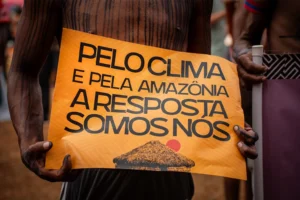
March during the Free Land Camp (ATL) in Brasília (April 10) advocating for Indigenous peoples’ participation in COP30 — Photo: Juliana Duarte
Climate Injustices
In August 2024, around 600 organizations signed and published the People’s Summit Political Charter (https://cupuladospovoscop30.org/manifesto/). “Real solutions are urgent, and civil society worldwide must be a protagonist in all debate spaces on this agenda. COP30 needs to represent a turning point in this scenario and address the necessary actions to confront the climate crisis,” demands the document.
This is not the first time COP organizers have faced a parallel space of resistance and demands. Similar initiatives occurred during Rio+20 (2012). The People’s Summit has established itself as an alternative space for critique and proposals, present in nearly all World Climate Conferences.
In November, representatives of social movements and traditional populations will discuss proposals to tackle climate challenges with justice, focusing on the realities of the territories, popular sovereignty, and well-being. Over the past two years, numerous debates, meetings, and plenaries have defined four main work axes: water, territory and people’s sovereignty; climate justice; just, popular, and inclusive transition; and youth, children, adolescents, women, and LGBTQIAPN+ diversities at the center of decision-making.
Currently, the People’s Summit aims to pressure and convince the Brazilian government to lead the proposal of bolder global temperature reduction targets. Since its launch at the end of 2024, the Political Charter has been delivered to the President of Brazil, Luiz Inácio Lula da Silva, to the National Operative Secretariat of COP30 (Secop), and to executive and legislative representatives.
The proposals include agrarian and urban reform, incentives for a solidarity economy, protection of traditional populations, and the fight against environmental and structural racism. “Extreme climate events, droughts, floods, landslides, and false climate solutions serve to deepen inequality and environmental and climate injustices, particularly in the territories, cruelly affecting those who contributed least to the climate, ecological, and civilizational crisis,” the document states.
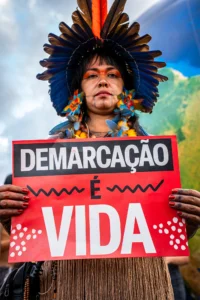
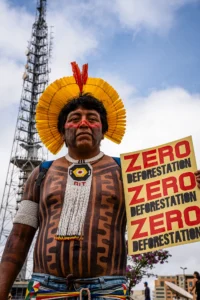
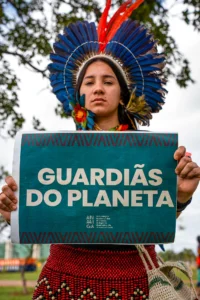
Indigenous peoples gathered at the ATL emphasize that land demarcation and the protagonism of traditional populations should be a priority in climate and environmental debates — Photos: Juliana Duarte
Living Without Destroying
The Summit also advocates a zero-deforestation policy and greater accountability for large corporations. Araê expresses additional concern about the current debate on a “just energy transition.” To him, the term merely masks a continuation of extractivist logic. “We don’t believe in this proposed transition. It doesn’t change the way nature is exploited, it only intensifies it. What is at stake is justifying accumulation and the expansion of capitalism with new mineral resources,” he stresses.
Another organizer, Eduardo Soares, Secretary of Articulation of the Pan-Amazon Ecclesial Network (Repam), tells Radis that representatives of religious communities will also participate actively. He is part of the Inter-Religious Tapiri, which brings together churches, ecumenical organizations, terreiro communities, Indigenous spiritualities, and other faith traditions in Brazil. “It is an ecumenical articulation that will also be present at the People’s Summit. We will discuss religious fundamentalism and defend freedom of expression and worship.”
Eduardo believes it will be a unique opportunity to show the world that it is possible to live without destroying. “Our spirituality, our way of living, our relationship with the forest, the river, and other living beings—all this is part of an integral ecology. It’s not just about reducing carbon, but changing the logic that destroys,” he asserts.
For him, the People’s Summit expresses territorial resistance to false market solutions. “It is a space where real life, thriving in communities, gains voice and proposes pathways,” he points out.
Genuine Participation of the Territories
Eduardo emphasizes the importance of this autonomous civil society space, committed to realities lived in the territories. “The Summit is born from the demands of the territories, not in a vertical way but horizontally, where communities and peoples can express impacts often caused by large corporations. Impacts that, within the COPs, are often distorted,” he argues. “Voices arise from the territories. The affected populations must be the first to be heard, bringing forward possible and necessary solutions.”
Repam expects that hosting the Summit will further strengthen alliances with grassroots organizations and traditional communities. “We want to contribute. Repam’s mission is to serve life in these territories. In this way, we can advance necessary changes regarding integral ecology and climate justice,” he says.
Both Repam and MAM advocate for the participation of Indigenous peoples present in Belém. “Our role is to amplify these voices. Active listening is essential to understand challenges and project the presence of these peoples. Their historical presence and ways of life must be guaranteed. Without this, there is no real response to the climate crisis,” Eduardo defends.
To highlight the relevance of this space, the Presidency’s Social Participation Council approved in February 2025 a resolution recommending federal government dialogue with the People’s Summit ahead of COP30. Although the recommendations are not binding, the gesture is viewed as an important political pressure tool.
The resolution highlights four main points: civil society participation in the COP30 technical group; the creation of a Global Alliance for Climate Justice; direct dialogue with the People’s Summit; and sharing initiatives with social participation forums.
In April 2024, the same Council had approved a first resolution requesting the federal government establish formal dialogue with the People’s Summit in COP30 preparations. The measure aimed to ensure qualified listening to social movements and traditional communities in the construction of Brazil’s official agenda.
“It reflects the proactive and qualified work of the organizations composing the People’s Summit and the Social Participation Council. Brazil has been a reference in expanding spaces for popular participation in decisions on global problems. We hope this resolution translates into a rich process of contributions to address climate change and environmental racism,” emphasizes Rud Rafael, from the National Coordination of the Homeless Workers’ Movement (MTST).
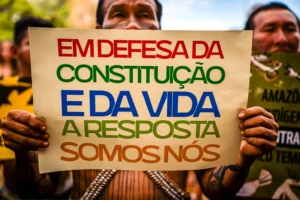
— Photo: Juliana Duarte
Beyond COP30
The fight for climate justice also involves visibility, mobilization, and territorial sovereignty before, during, and after COP30. Araê emphasizes that the process goes beyond the event: “We enter the Summit believing in a process that does not end with the event. We are building other economies, other ways of relating to nature. We, peasants, riverine and forest peoples, have resisted and presented resilient proposals to climate change.”
Organizers expect the People’s Summit to be a mobilization landmark that transcends the official event. “It doesn’t end in 2025. We are building a process that continues in the territories,” Araê adds.
Eduardo hopes Belém will be remembered not only for hosting COP30, but also “as the territory where peoples said: enough. And presented other ways of living, coexisting, and caring for the ‘Common Home.’”
Timeline – People’s Summit for Climate Justice
2022
Belém announced as COP30 host
2023
Social movements begin organization and listening processes in the territories
During the Amazon Summit, the People’s Summit proposal emerges
Political Commission of the Summit formed by leaders nationwide
2024
People’s Summit Political Charter launched with over 600 signatory organizations
National and international mobilization expanded through plenaries, caravans, and thematic articulations
2025
Parallel to COP30, the People’s Summit will be held in Belém with political, cultural, and spiritual activities
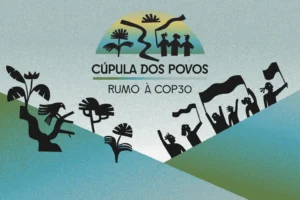
The 6 Axes of the People’s Summit Political Charter
Anti-capitalism – Critique of profit-driven development and the exploitation of nature and peoples
Gender justice – Defense of women’s rights and sexual and gender diversity in the territories
Anti-racism – Combatting racist structures affecting Black, Indigenous, and peripheral populations
Just energy transition – Against “green extractivism” and for popular energy models
Democratization of Climate Policy – Genuine participation of peoples in decision-making spaces
Defense of Territories – Guaranteeing sovereignty, demarcation, titling, and protection of traditional ways of life
Reproduction: Revista Radis – Fiocruz. CLIK HERE.
